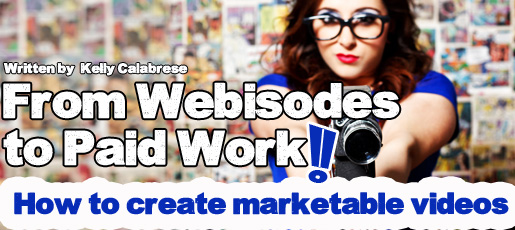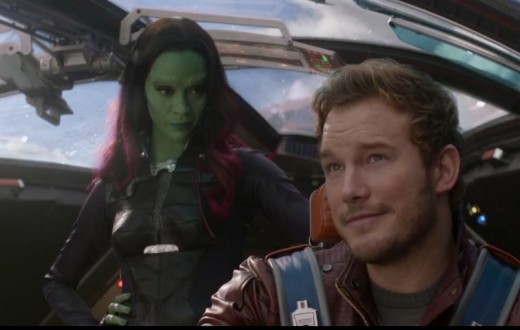You’ve heard of “being in it to win it” + having “a dollar and a dream.”
Well… if you want to become a successful web video creator – all it takes is a camera and a compelling idea! So get ready to put your creative talents to work with helpful advice from these successful storytellers.
First up, web video battle tactics from…
Matthew Semel – of Cowboy Bear Ninja
Cowboy Bear Ninja – is a collective of cool storytellers comprised of Matthew Semel, Miguel Drake-McLaughlin, Rufus Lusk, Hilary McHone, Adrian Selkowitz, and Corey Tatarczuk.
Recently Matthew Semel created this bit of web hilarity – Tracy Morgan in 140 Characters or Less.
So Matthew…
Q: How did you launch into creating web videos?
I got started with a company called 10 Ton. We thought web video was going to get where it is now, very quickly. We didn’t realize it was going to take a while. We began trying to make it an advertising company. We did carded.tv (video ecards!), which we viewed as a slightly different way to do a web video. And then, the next thing I did was the Nickelodeon show, which was a work for hire. Now it seems like most video work is just for the web. So many companies are doing it. They have these great distribution options.
Q: Why did you get into creating web videos?
When it was coming out it just seemed like a smart place to be. The web had already proven itself as a place to make money. It just seemed like the next step; a place you could grow without much competition. Now that has changed.
Q: Can someone who is just starting out now – still make a living at creating web videos?
I really think it is just like any industry. You can make a living out of it. And, it comes down to your contacts – who knows you and who will hire you, and that is just a matter of effort and time. The more time you spend networking, the more you will get out of it.
Q: Did you make money right away with this company / projects?
For most of the time, I was sticking with my regular commercial work and animation. But over the years I have met with a lot of studios and network.
Q: Did meeting all these people help your work grow?
Between doing those first web videos and starting a meetup group called – BigScreen LittleScreen – and being in the space for a long time, it has been helpful. I got to see what people do and learn more about what works, and what doesn’t work. And that seems to change a lot. People will say that videos have to be short, and then they will say it can be long. I think the only rule that always applies is that it has to be interesting right away. A good example is the blog kottke.org – a very good blog that has been around for a long time. Everything he posts is interesting. One problem that a lot of people have is they waste 90 seconds and then get to what is interesting. In web video, you have to make the first 15 seconds touch people.
It’s just like when you visit a website and the page takes a second or two to load – you give up on it. And for web videos, it is the same thing.
Q: What made you begin the bi-coastal meetup group – BigScreen LittleScreen?
I co-founded it over five years ago. It is a place to come and show your work. A lot of times, when you make a video and put it on the web the only feedback you get are comments. And you know how comments go. The meetup is a way to show your work to a group of people and get real time feedback. See where people laugh. See what works. It is completely different to show your work to an audience.
Q: What are some good ways to network and build contacts?
In terms of networking in NY and LA it is easy. Go to meetups and tech events. Just be around to find out about more events. On top of that, it is nice to network outside of the space in other industries because those are people who might hire you.
Q: How do you make money off creating web videos?
If you can find the right target for a client, it is not that hard to make money. Everyone wants video right now. A lot of people still don’t realize that video actually costs money. But others are aware and very into it. A growing market is web videos for startups that demonstrate their product. I am actually teaching a class on this in two weeks at General Assembly called Show & Tell: Make a Video for Your Startup.
Q: Which are most successful web videos?
The most successful web videos are not the kind of thing I am doing. I went to film school and come from the background of making movies with people behind them. The budgets of web videos do not support that. The people who are most successful are the individuals. The people on the YouTube partner programs who do everything – actor, director, and editor. The one man or woman band makes the most money.
There is a real formula for success: To make something, to make it frequently, to have audience interaction, to be authentic, and essentially to just do it yourself.
For one person, $100,000 is a great income for being creative and loving what you do. But $100,000, when you have a crew of eight people involved, is not enough money to make it full time. That is why the smaller people have been so successful. And they are sought after by advertisers.
Q: Advertisers actively seek out web video creators?
Yeah. There are platforms that read the channels and connect them to the advertisers. Brands are looking for those people. The Collective is the biggest agency for it. They connect people just like any other agency would do.
Q: How do you create authentic, unique content?
Whenever we get a project we make sure we spend time on it, even if it is a crazy rush. Thinking about the creative side of things, and how to do it in a good way is very important. We try to standardize our production. Every time something comes up we have a list of questions. So even if we are shooting in two hours, we have the list to look at – Have we thought about visual style? How to tell the story? Even if is an interview, we go through the list. It forces us to not go forward unless we address the issues.
Q: Can regular videos – webisodes, or a one-off video, make someone money?
Yes. People get discovered doing that kind of stuff. Isn’t that how Justin Bieber got started?!
Q: Who? What! Never mind. Moving on ; ) — WHAT is your advice to actors who want to create their own material for the web?
Just do it. You can do it any way you want. You can shoot it on your iPhone, if you want to.
It does pay to learn a little of the craft. Learning filmmaking and storytelling is going to make your stuff better. And there are great books. Also, getting on other people’s sets is a great way to learn. That is what you do in film school. People will always want you to work for free. Even if you have zero experience, they will let you work for free.
Thanks Mr. Matthew. – To learn more from Matt – take this class on August 27th in NYC Show & Tell: Make a Video for Your Startup.
And now I proudly present Story Developing guru’s…
Ryan Lynch and Matthew Walker – Creators of StoryDeveloping.com
Story Developing LLC is a short film making, strategy driven, bi-coastal living, cost cutting, behavior changing team of marketing minded, video producing professionals. They make short films for companies and brands that want to use the power of storytelling to connect with their target.
Q: What kind of webisodes / online content have you created?
As partners of Story Developing, we (Matt Walker and Ryan Lynch) bring a huge variety of experience with online content. Matt produced a series of web videos for Mitchum Deodorant and Dockers and most recently directed a series titled “A New York Story” that appeared on the Huffington Post. Ryan’s background is in strategy at traditional advertising agencies helping brands like Campbell’s, Dannon and Esurance. Together, the duo most recently produced an online video for a new camera company called Lytro, titled: “Love Love Love.”
(This, FYI, held casting through NYCastings!)
Q: What got you started in creating online content?
Matt was producing a huge variety of online content — some for brands, others for entertainment. Ryan realized that if we could merge his understanding of branding with Matt’s ability to produce beautiful and interesting stories, we’d be in a position to help brands connect to people.
Q: Can you make money off webisodes / online content?
Absolutely you can make money. There’s tons of data showing huge increases in online video, it’s just a matter of figuring out your niche. You need to either produce content that consistently draws an audience — like Revision3’s “Epic Meal Time” — or you need to help brands produce content w/ a brand message.
For us, it’s about working with brands. Specifically, we realized that every interesting brand has an interesting story. If we can help brands tell that story (via online video) in a way that connects to people, we’ll earn a decent living. Make no mistake, brands realize the importance of connecting to their target online. AND, brands are like everyone else, they’re tightening their budgets and looking for more efficient ways to create content — we provide a much more efficient model than an ad agency could ever achieve.
Q: What does it take to succeed, what level of quality?
Quality is obviously important – but in the end it’s the story that really matters. If you can consistently tell compelling stories, you’ll do great. Stories conjure emotion, they’re remembered and most importantly, stories get passed along. Consistency is also a huge factor no matter which route you take. You need to prove to the person writing the check that your work is worth their money.
Q: Are there certain types of online content that is most marketable?
The obvious answer is to tap into pop culture. But, I think the better answer / challenge is about bringing your content to the world faster than anyone else.
Q: What is your advice to actors who want to create their own material for the web?
Keep It Simple. The simplest story told in the least amount of time is usually the one that is remembered and passed along the most.
Q: AND, of course, tell us about Story Developing and how you got your company up and running!!!
Ryan recently broke his back in a ski accident and when Matt came to visit we started talking about the importance of doing something you really cared about. We decided at that moment to do something. What we realized was that we both brought a unique skill set to the table that met three important trends happening in the advertising market place:
1. People connect to stories.
2. Video is increasingly how people consume information.
3. Efficiency is mandatory — people, brands and marketers.
Together, we’d provide strategically sound, beautiful brand stories.
SUPER COOL. I Love Love Love it 😉 Thanks guys!
And finally – insight from a gal who is just getting her webisode sea legs wet…
Veronica Dang – Creator of Subway: The Series
Veronica Dang was born in Pennsylvania to a family that barely escaped Saigon alongside the last U.S. troops in Vietnam. Settling in Virginia just outside Washington DC, Veronica was following a traditional Asian-American path – classical pianist starting at the age of 5 then receiving a B.S. degree in Biochemistry on her way to medical school – when she was unexpectedly blindsided by the magic of film, music, television and theater. She studied acting at the American Academy of Dramatic Arts, improv with the Upright Citizens Brigade and training with acting legends including John Barton and F. Murray Abraham.
Q: What kind of webisodes / online content have you created?
A scripted comedic webseries called Subway: The Series. It follows a Pennsylvania Dutch IT girl who got shunned by her adoptive parents and is struggling to survive in NYC with the help of an aspiring sandwich “artiste”. Each episode is inspired by real subway characters/events and features local NYC indie musicians.
Q: What got you started in creating online content?
As an actress I am always told to create my own work. But it wasn’t until a trip to LA for this past pilot season that everyone there (teachers, coaches, casting directors, other actors) was either recommending or creating their own online content. For a few years I had been sitting on an idea to create a series that reflects the real diversity and craziness of NYC that I and many others witness on the subway.
Q: Can you make money off webisodes? I hear and read it is possible but highly unlikely for first time webisodes.
Successful series tend to have good production value, clear niche (sci-fi/gaming very popular) with built in audience and lots of funding. Very helpful if there is a good publicity angle – major product branding, celebrities, popular TV show, etc associated with it
Q: What is your advice to actors who want to create their own material for the web?
Just do it. But definitely be clear about why you are creating your own work, what you hope to get out of it and feel passionate about what you are doing. Especially since producing is stressful and if you want people to see it then marketing is even more work.
Q: AND, tell us about what you have going on in your acting world!
My whole life now is revolving around getting Subway: The Series made. But I performed my dream role of Helena in Midsummer Night’s Dream in England, and got cast in the lead role of an indie feature about high stakes gambling.
Congrats Veronica! Keep up the momentum.
Now readers – what are you waiting for? Pick up your camera, form an idea, and create web video magic!







